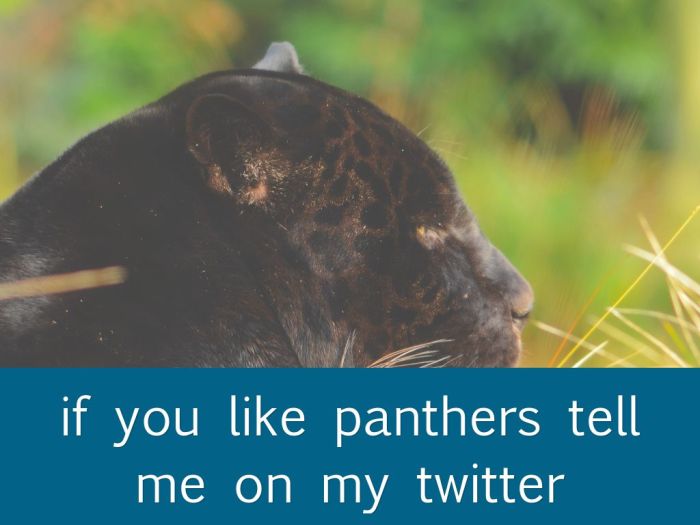If called by a panther don’t anther – If called by a panther, don’t answer—a timeless proverb steeped in wisdom and intrigue. This enigmatic adage invites us to delve into its multifaceted layers, exploring its historical origins, cultural significance, and practical applications. As we unravel the tapestry of this proverb, we uncover valuable lessons about safety, caution, and the art of discerning true intentions.
Throughout history, this proverb has resonated across cultures, transcending geographical boundaries and linguistic barriers. Its origins lie in the realm of animal behavior, where panthers are known for their stealth and predatory nature. By cautioning against answering a panther’s call, the proverb serves as a metaphor for avoiding potential dangers lurking in the shadows.
Interpretation of the Proverb

The proverb “If called by a panther, don’t answer” has a literal meaning that warns against responding to dangerous or deceptive invitations. Figuratively, it cautions us to be wary of alluring but potentially harmful situations or individuals.
Literal Meaning
Panthers are solitary and predatory animals. Their calls are often used to attract prey or communicate with their young. Answering a panther’s call, therefore, could lead to an encounter with a dangerous predator.
Figurative Interpretation
In a figurative sense, the proverb teaches us to avoid temptations that may lead to harm. It warns against engaging with individuals or situations that appear attractive but may ultimately pose a threat to our well-being or safety. By not answering the call of a “panther,” we protect ourselves from potential danger.
Historical Origins and Cultural Significance

The proverb “If called by a panther, don’t answer” has a rich history and cultural significance, tracing its roots back to ancient African and Native American folklore.
In many African cultures, panthers were revered as powerful spirits or deities. To call upon a panther was considered a dangerous and potentially life-threatening act, as it was believed that the panther would seek retribution for being disturbed.
Cultural Usage
The proverb became widely used as a warning against taking unnecessary risks or provoking danger. It emphasized the importance of respecting nature and avoiding situations that could lead to harm.
In Native American cultures, the panther was often seen as a symbol of courage and strength. However, it was also believed that panthers were solitary creatures that preferred to be left alone. The proverb served as a reminder to respect the boundaries of wild animals and to avoid approaching them unless absolutely necessary.
Applications in Daily Life
The proverb “If called by a panther, don’t answer” has wide applicability in everyday life. It serves as a cautionary reminder to exercise prudence and discretion in our actions and interactions.
One key area where this proverb can be applied is in social situations. When faced with invitations or requests from strangers or unfamiliar individuals, it is wise to proceed with caution. Just as a panther’s call may be a lure to danger, seemingly innocuous invitations can sometimes conceal ulterior motives or potential risks.
Consequences of Disregarding the Proverb
Disregarding the advice of this proverb can have significant consequences. If we blindly accept invitations or requests without due consideration, we may expose ourselves to unnecessary risks or even danger. In social situations, we may become entangled in uncomfortable or even dangerous encounters.
Similarly, in business or financial matters, responding to unsolicited offers or proposals without thorough research can lead to financial losses or reputational damage. By heeding the proverb’s warning, we can protect ourselves from potential pitfalls and make more informed decisions.
Similarities and Differences with Other Proverbs
The proverb “If called by a panther, don’t answer” has parallels in other languages and cultures, each with its own nuances and variations.
In many cultures, there are proverbs that warn against responding to dangerous or unknown entities. For example, the Chinese proverb “A tiger’s roar does not scare a wise man” conveys a similar sentiment, cautioning against rash actions in the face of potential threats.
Common Themes
- Caution and prudence:Proverbs like “If called by a panther, don’t answer” emphasize the importance of being cautious and avoiding unnecessary risks.
- Recognition of danger:These proverbs acknowledge that certain situations or individuals pose potential dangers that should be recognized and avoided.
- Avoidance of trouble:The primary message of these proverbs is to avoid getting into trouble by not engaging with potentially dangerous or problematic entities.
Variations
While the core message remains consistent, variations exist in the specific wording and imagery used. For example, in some African cultures, the proverb takes the form of “When the leopard calls, do not answer,” highlighting the specific danger posed by leopards in that region.
The use of different animals as metaphors for danger reflects the cultural context and the specific threats that people in different regions have faced historically.
Modern Interpretations and Adaptations: If Called By A Panther Don’t Anther

The proverb “If called by a panther, don’t answer” has undergone contemporary interpretations and adaptations, reflecting the evolving nature of human experience and cultural contexts.
One notable adaptation is its application to modern communication technologies. In the digital age, the proverb serves as a caution against responding to unsolicited messages or calls from unknown or suspicious sources, particularly those that may lead to phishing, scams, or malware attacks.
In Literature
In contemporary literature, the proverb has been used as a metaphor for caution and discernment in navigating complex social situations. For instance, in Chimamanda Ngozi Adichie’s novel “Americanah,” the protagonist Ifemelu faces the dilemma of whether to engage with a former lover who has reappeared in her life, and the proverb guides her decision-making process.
In Art, If called by a panther don’t anther
Visual artists have also explored the proverb’s themes. In a series of paintings by Kehinde Wiley, entitled “The Panthers,” the proverb is reimagined through depictions of African American men posing as classical Greek heroes, highlighting the resilience and strength of marginalized communities.
Literary and Artistic Representations

The proverb “If called by a panther, don’t answer” has been a subject of interest in literature, poetry, and art for centuries. It is often used as a metaphor for danger or the need to be cautious.
In Literature
In literature, the proverb has been used to convey the idea of a hidden threat or danger that may not be immediately apparent. For example, in William Shakespeare’s play “Hamlet,” the character of Polonius warns his son, “If called by a panther, don’t answer.”
This is a warning to Hamlet to be wary of those who may seem friendly but have ulterior motives.
In Poetry
In poetry, the proverb has been used to explore themes of fear, uncertainty, and the need for caution. For example, in the poem “Panther” by Rainer Maria Rilke, the speaker describes a panther pacing in a cage. The speaker is fascinated by the panther’s beauty and power, but also feels a sense of fear and unease.
The poem ends with the line, “If called by a panther, don’t answer,” which suggests that the speaker is aware of the danger that the panther poses.
In Art, If called by a panther don’t anther
In art, the proverb has been depicted in a variety of ways. For example, in the painting “Panther” by Henri Rousseau, a panther is depicted lurking in a jungle. The panther’s eyes are fixed on the viewer, and its body language suggests that it is ready to attack.
This painting is a powerful reminder of the proverb’s warning to be wary of hidden dangers.
Educational Value and Impact
The proverb “If called by a panther, don’t answer” holds immense educational value, offering valuable lessons about safety, caution, and decision-making. It serves as a cautionary tale, reminding individuals of the importance of being vigilant and discerning in unfamiliar situations.
Safety and Caution
The proverb emphasizes the significance of exercising caution in the face of potential danger. It teaches the importance of not blindly trusting strangers or situations that may appear inviting but could lead to harm. By urging individuals to avoid engaging with unknown entities, the proverb promotes a sense of self-preservation and encourages people to prioritize their safety.
Decision-Making
The proverb also underscores the importance of thoughtful decision-making. It encourages individuals to carefully consider the potential consequences of their actions before responding to unfamiliar or suspicious requests. By teaching people to assess situations critically and make informed choices, the proverb fosters a sense of responsibility and helps individuals develop sound judgment.
Essential FAQs
What is the literal meaning of the proverb “If called by a panther, don’t answer”?
The literal meaning refers to the danger of approaching a panther, as panthers are known to lure prey by imitating human voices.
What is the figurative interpretation of the proverb?
Figuratively, the proverb advises against responding to deceptive or malicious invitations that may lead to harm.
How can the proverb be applied in daily life?
The proverb can be applied to situations where we encounter suspicious individuals or circumstances that could potentially pose a threat.
What are some other similar proverbs in different languages?
Similar proverbs include “Don’t trust a smiling crocodile” (Chinese) and “Beware of wolves in sheep’s clothing” (English).